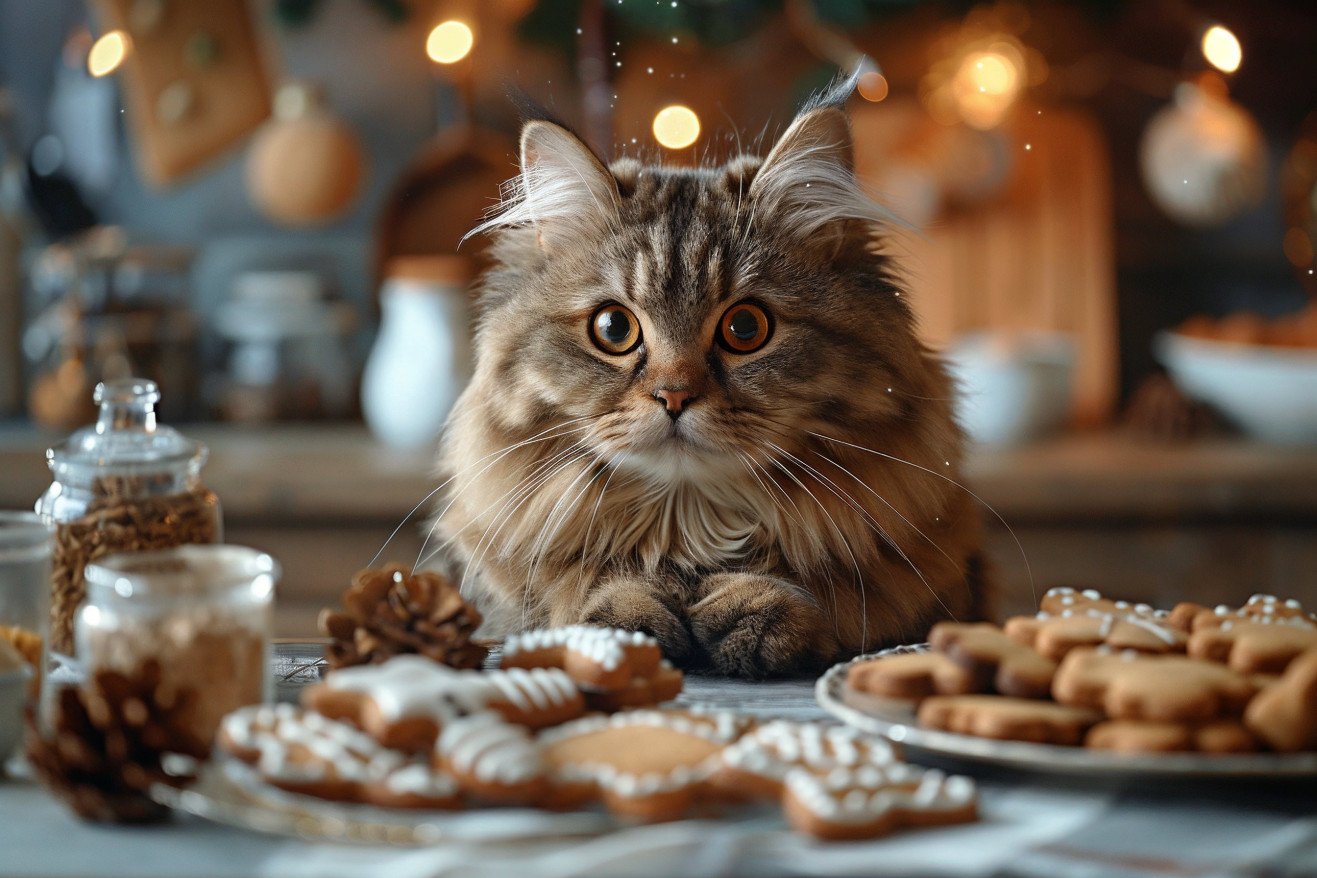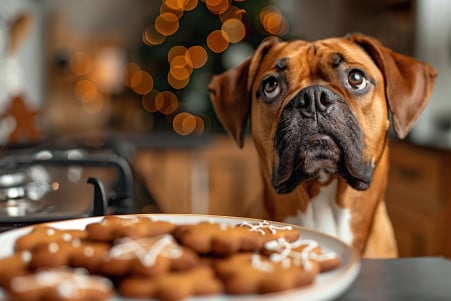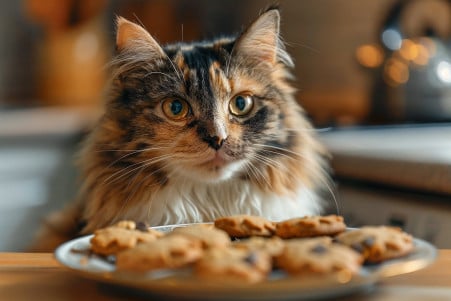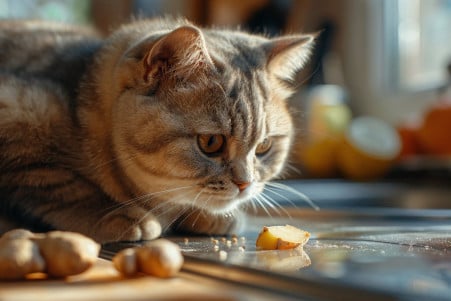Is Gingerbread Safe for Cats to Eat? What Science Says About Feline Nutrition
8 May 2024 • Updated 8 May 2024

If you’ve ever tried to keep your cat away from your gingerbread house, you know that cats can be curious about this holiday treat. But is it safe for cats to eat gingerbread? No, cats cannot eat gingerbread. The ginger, molasses, and other spices in gingerbread can cause digestive upset, and the sugar and fat in gingerbread can contribute to obesity and pancreatitis in cats. In addition, gingerbread often contains raisins or chocolate, which are toxic to cats.
To understand why gingerbread is bad for cats, we’ll look at scientific studies on feline nutrition and the potential risks of the ingredients in gingerbread. This will help you understand how to feed your cat a diet that’s safe and healthy, and it will help you enjoy your gingerbread in peace.
Can cats eat gingerbread?
Dangerous Ingredients in Gingerbread for Cats
There are several ingredients in gingerbread that are dangerous for cats. The sugar and molasses in gingerbread can lead to obesity, diabetes, and dental decay, Catster explains. While the spices used in gingerbread, such as nutmeg, cinnamon, and cloves, might not seem dangerous, they can cause upset stomach, hallucinations, increased heart rate, and even seizures in cats.
The butter and other fats in gingerbread are also worrisome because they can cause pancreatitis and other problems in cats. Some gingerbread recipes may also include artificial sweeteners like xylitol, which is extremely dangerous for cats. Raisins and chocolate are other ingredients to watch out for because they are both known toxins for cats.
Given all of these dangerous ingredients, it’s best to avoid giving your cat gingerbread. However, there are safe, cat-friendly options you can make at home to ensure your cat doesn’t feel left out of the holiday fun.
Safe Alternatives: Homemade Cat-Friendly Holiday Treats
Pet parents can make homemade cat-friendly holiday treats with ingredients like canned tuna, salmon, chicken, and whole grains, says EPiQ Animal Health. These treats are typically made with basic ingredients such as eggs, flour, and vegetables, which means they won’t contain the spices and sweeteners that are dangerous to cats in gingerbread.
Making treats at home also makes it easier to control portion sizes and customize treats to meet a cat’s individual dietary requirements or taste preferences. Plus, as BeChewy points out, homemade treats don’t contain any hidden or toxic ingredients, so they’re a safe and festive option for cats. Some popular treats include tuna gingerbread cookies, salmon bites, and catnip treats for extra enrichment, as shown in the Feast + West recipe.
While gingerbread is a no-go, these homemade options make it possible for cats to enjoy holiday flavors in a way that’s safe and let them join in on the holiday fun. That said, pet parents should still be on the lookout since accidental consumption of gingerbread or other toxic foods can be dangerous to cats.
Signs and What to Do If Your Cat Eats Gingerbread
If a cat eats gingerbread, pet parents should look out for signs of digestive distress, such as vomiting or diarrhea, according to FirstVet. However, eating too much of the ingredients in gingerbread, like spices or baking soda, can cause more serious issues, including choking, increased heart rate, and seizures, according to Catster.
If a cat shows any signs of distress after eating gingerbread, pet parents should call their vet immediately for guidance and care. A vet may recommend vomiting, activated charcoal, or supportive care, depending on the situation, according to the FirstVet article.
Of course, the best way to deal with gingerbread and other potentially harmful foods is to prevent cats from getting into them in the first place. While eating gingerbread may not always be a cause for concern, it's important to be aware and take action to ensure a cat's safety.
More Holiday Hazards: Other Foods That Are Bad for Cats
In addition to gingerbread, there are several other holiday foods that are toxic to cats. As reported by CBS News, chocolate, eggnog, and fruitcake are all dangerous for cats. The high fat content and the presence of onions, garlic, and alcohol in these foods can lead to digestive upset, pancreatitis, and even organ failure in cats.
Daily Paws explains that turkey skin and ham are also high in fat and can cause vomiting, diarrhea, and other gastrointestinal issues in cats. Meanwhile, grapes and raisins, which are often found in fruitcakes and other holiday treats, are particularly concerning because they can cause kidney failure in cats.
To ensure that cats stay safe during the holidays, it's best to avoid giving them any human food and instead stick to cat-friendly treats and activities. By learning which common holiday foods are toxic to cats, cat parents can make sure that their pets stay healthy and happy during the holiday season.
Festive Feline Fun: Enrichment Activities for Cats
Instead of giving cats people food, pet parents can offer enrichment through toys and activities. Puzzle feeders, treat balls, and food-dispensing toys can help cats stay entertained and mentally sharp during meal times, says Rover. Catnip toys, scratching posts, and cat trees can help cats satisfy their natural instincts and get exercise, according to Daily Paws.
Clicker training or trick training can help strengthen the bond between cats and their owners and offer mental stimulation, while spending time together with wand toys or laser pointers can help cats get the exercise and interaction they need during the holidays, says Petplan. By focusing on enrichment instead of holiday indulgences, pet parents can make sure their cats are healthy and content throughout the holiday season.
Conclusion: How to Keep Your Cat Safe and Happy During the Holidays
While gingerbread and many other holiday treats are not safe for cats, there are still ways to celebrate the holidays with your favorite feline. You can make homemade, cat-friendly treats with ingredients that are safe for pets to ensure that your cat gets to enjoy a holiday treat without getting sick. You can also make sure that your cat is mentally and physically stimulated by engaging in enrichment activities and providing toys that are safe for them to play with.
If your cat does accidentally eat something that is toxic to them, it's important to make sure that you know the signs of poisoning and that you get them to the vet as soon as possible. By making sure that you are aware of your cat's dietary restrictions and that you are providing a safe, stimulating environment for them, you can make sure that your cat has a happy and healthy holiday season.


